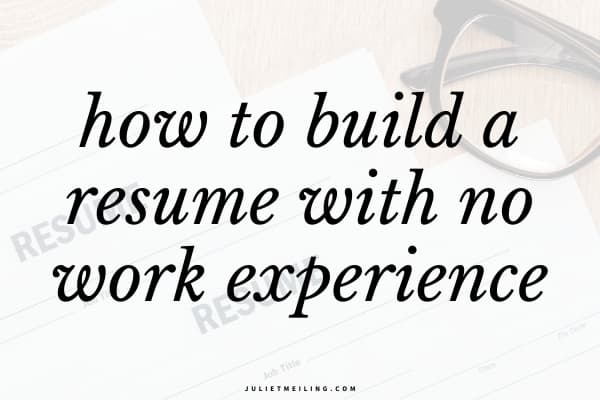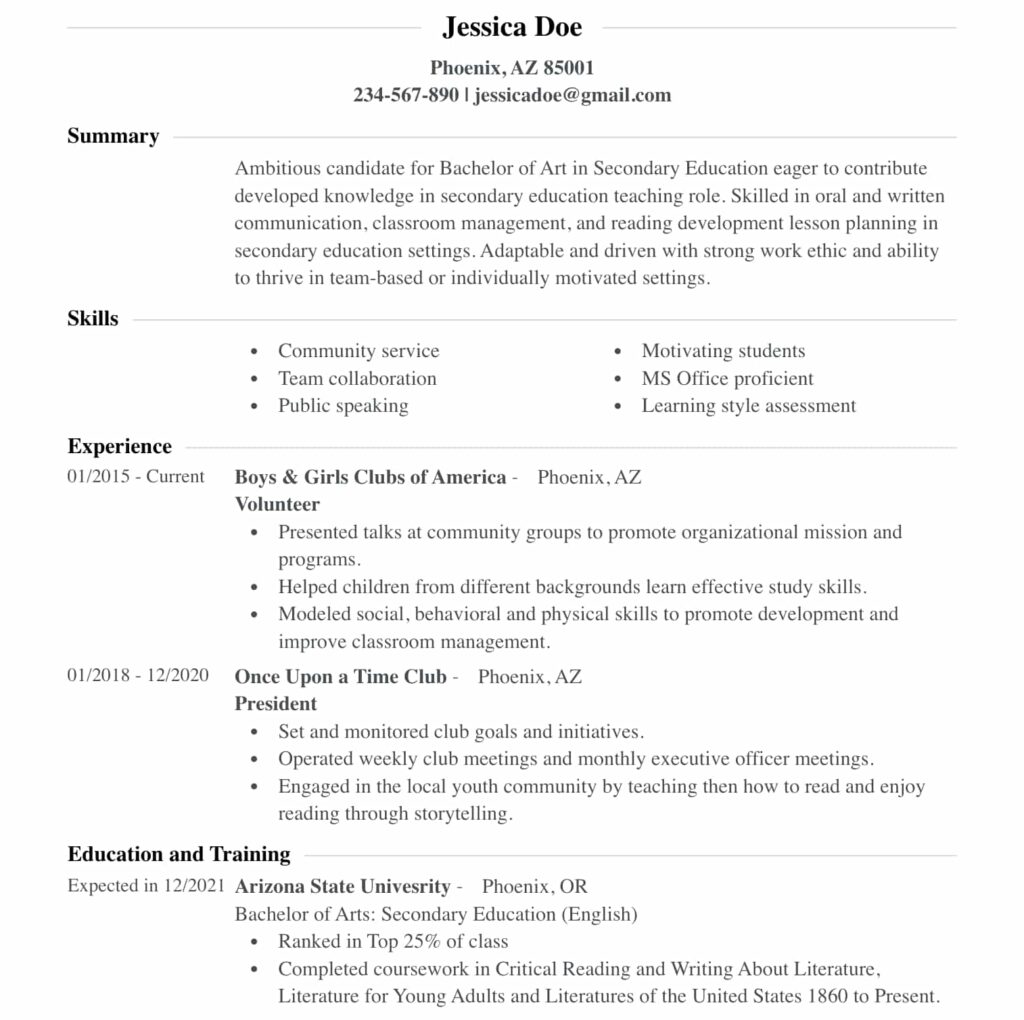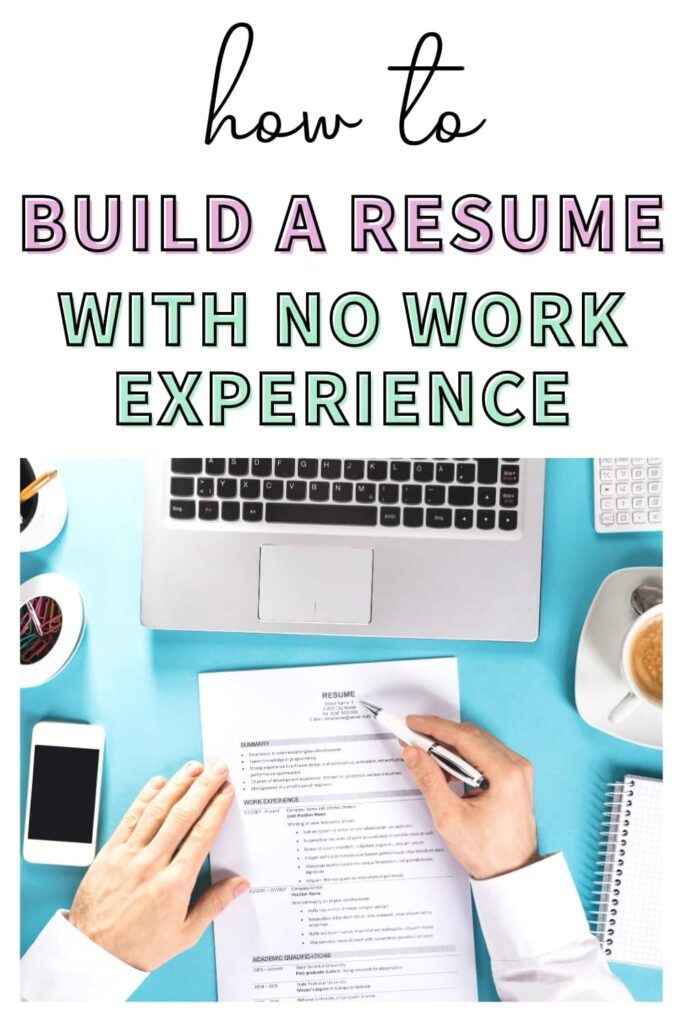How To Build A Resume With No Experience As A College Student
Learn how to write a resume that will score you your first job out of college even with no prior work experience.
Building an all-encompassing resume is easier said than done especially if you don’t have prior work experience. It’s often assume having limited job experience hurts your chances of landing a job.
But this is untrue, and really, it simply comes down to having a well formatted resume that showcases relevant experiences and skills you have learned throughout college.
And quite frankly, regardless if you have work experience or not, you need to start somewhere if you want to successfully transition from college to adulthood.
Then once you gain your first job experience out of college, you’ll be able to start working your way to more professional and higher earning jobs.
In this blog post we are going to discuss how to create your first resume as a college student with no work experience.
The tips in this blog post will hopefully help you score a job after college or your first internship experience. So without further ado, let’s get started!
- Learn how to write a resume that will score you your first job out of college even with no prior work experience.
- How to format your resume for your first job out college
- Example resume with no experience
- 7 tips for building a good resume with no work experience as a college student
- 4 things not to include on your resume
- Final thoughts on how to build a resume as a college student with no work experience
- Thanks for reading about how a college student can make a resume with no experience.

*This post may contain affiliate links. Purchasing a product or service through an affiliate will earn me a small commission at no additional cost to you. Please read our Disclaimer Policy for more information about the use of affiliate links on this site.
How to format your resume for your first job out college
When it comes to creating a winning resume, format matters.
In fact, having an unorganized, unprofessional resume can send your resume right into the trash can before anyone can even read it.
According to HR Drive, job recruiters only look at resumes for an average of 7.4 seconds.
That means you need to format your resume in a way that grabs and holds the attention of job recruiters and hiring managers for an extended amount of time.
So what does this exactly mean in regard to resume formatting?
Simply put, you need to create a winning resume that is:
- Logical
- To the point
- Highlights your relevant experience(s) in relation to the job you are applying for
In this section we will go into detail about:
- How long your resume should be
- What color(s) and font(s) you should use on your resume
- The general format your resume should follow
- Software options for creating and formatting your resume
How long should a resume be for a college student?
Yes, that’s right–you have one page to make an impression to job recruiters and hiring managers and, hopefully, move forward in the hiring process.
If you have no prior work experience, the one page limit may even be a relief to you.
Even more so, having a one-page limit can help you showcase your most relevant experience and skills related to the job you are applying for instead of adding unnecessary fluffy that may hinder your job prospects.
What color(s) and font(s) should you use on your student resume?
The use and preference of which color(s) you should use on your resume is up for debate.
Some hiring professionals would say only use a black text on a white background, but others would say that it is ok to add some color.
However, it really depends on the job you are applying for and the nature of the workplace.
If you’re applying for a job as a graphic designer, using color on your resume would be more appropriate versus applying for a job as a secretary at a law firm.
In regard to font(s), it’s simple: use an easy-to-read, clean font like:
- Arial
- Cambria
- Calibri
- Times New Roman
Also, be sure to use that font consistently throughout your resume (aka no mixing and matching fonts).
Personally, I always stick to black text on a white background with Times New Roman font for all of my resumes (and cover letters).
The general format you should use
Resume creation doesn’t have to be complicated.
Written below is a format you can use for your resume that will keep your resume organized and make it easier for hiring recruiters to find the information they need.
General Format
- Contact information
- Full name
- Mailing address
- Email address
- Phone number
- Overview or objective statement
- Education
- General experience (volunteering/school-related tasks)
- Achievements
- Job-related skills
Notice how this format does not include a section for work experience. As mentioned previously, it is possible to create a complete resume without job experience.
Instead, you can utilize the format to your advantage by fully fleshing out the relevant experience(s) that sheds light on your potential as a candidate for the job.
When you format your resume the right way, you’ll get noticed by recruiters and they will call you in for interviews.
Don’t let the fact that you don’t work experience prevent you from applying to jobs or make you feel you are less qualified. Instead, just make sure to spice things up and add as much value to your resume as possible.
What software can I use to create and format my resume?
Luckily there are plenty of options for creating your resume that are free and easy to use.
The most accessible one being Google Docs.
However, if you aren’t as tech savvy you can use an online resume builder like Resume.com (I personally have used this one).
I personally like using online resume builders because I don’t have to format the resume at all. Instead, all I have to do is focus on writing the text and making sure I have good grammar and punctuation.
The resume builder does the “heavy lifting” for me aka formatting and aesthetics. Plus, I can get the finalized resume as a PDF or Word Document, which is perfect for submitting on Indeed, Monster, or any other job listing website.

Need a physical guide that covers the ins and outs of resume building for college students? This book is my absolute favorite. And although it was written for college students majoring in psychology, the information can be applied to any college student seeking employment after college graduation.
Example resume with no experience
Before going into a few tips and tricks for resume building, below is a resume example for a college student who has no work or internship experience.
Instead, this imaginary student, we’ll call her Jessica Doe, is focusing on highlighting her volunteer and club experience to get her a job as a secondary education teacher.

7 tips for building a good resume with no work experience as a college student
How can you make your resume stand out when you have no work experience?
Here are 7 tips that will help you use your non-work experience to your advantage on your resume.
1. Include a complete summary statement
This is often termed as the “overview” or “objective statement” and it plays a critical role in defining the rest of your resume.
This statement should provide insight into what you are aiming for as a budding professional, your skillset, and what you are going to bring to the position you are applying for.
It should only be a sentence or two breaking down what you are going to provide to the employer.
However, remember, the average employer is not looking to learn more about your aspirations. These details don’t matter to them as much as you think!
Instead, they just want to know why you are a good candidate for the particular job listing. This is what you want to make clear in the overview or summary statement.
Here is a brief example taken from one of my resumes: Candidate for Bachelor of Science in Psychology from the University of Georgia with strong communication, organization, time management, and computer skills.
You can find more awesome career objective statement examples by clicking here.
2. Choose the right resume format
When you are fleshing out a resume, you want to format it in a way that showcases you as a job candidate the best.
In general, you are going to want to play around with different option(s):
- Chronological
- Functional
- Hybrid
The format you go with is ultimately up to you, but it is often recommended to go with a format that is easy to follow.
More importantly, if you are inconsistent with the layout, this is going to put you in a bad light professionally.
With a chronological resume, you are going to focus on listing everything based on a timeline. You start with the most recent experience you’ve done and work backward.
On the other hand, a functional resume tends to work well for those with no experience because it is going to focus on your skills.
If necessary, you are always welcome to play around with a hybrid resume format, where you list your skills and achievements while following a chronological order (from most recent to oldest).
3. Focus on grammar and punctuation
It seems silly to say, but you are not going to have as much leeway as a seasoned professional with years of relevant experience.
Employers are not going to be as forgiving when you have grammar or punctuation mistakes. And any grammar or punctuation errors are going to stand out in a bad way.
Even if your resume is chuck full of value, a single misspelling or weird grammatical error can send your resume to the trash bin.
So take your time to go through the resume multiple times. And have other people you know and trust read it beforehand.
I’d recommend getting your mom, dad, or even better, a professor or someone at your university’s career services center to read and critique it.
Having a second, third, or even fourth opinion about your resume can help you create an even better resume and make you stand out despite your lack of work experience.
4. List relevant achievements and or activities
Although you may not have work experience (or very limited work experience) that doesn’t mean you have nothing valuable to add to the workforce.
In fact, you may have a few achievements that would be relevant to the job(s) you are applying for. Or maybe you were part of a club or honor society in college that is relevant.
Whatever it is, make sure to mention it on your resume along with a few bullet points about the achievement or activity that highlights your responsibilities and or accomplishments related to that experience.
For example, if you are applying for an Information Technology (IT) job list any certifications you have obtained or personal projects you have completed.
Or maybe you were part of the gardening club in college and you held a leadership position in that club. On your resume, you can list the duties you had as a leader in the club that relates back to the job you are applying for.
5. Highlight your academic history
One thing on your resume you can use to your advantage is your education.
Many employers love college graduates because they have learned the latest concepts and can add value and innovative ideas to their business.
With your academic history, make sure to highlight how it relates to the job listing.
For example, if you are studying computer science, you can list some core concepts that are related to the IT job that you are applying for. This can include specific coding languages you have learned, like CSS, HTML, Python, C++, etc.
You can also list upper-level classes you have take that relate to the job you are applying for.
But don’t list general education classes like World History or English. They’re too generic and don’t add any true value to your resume.
For example, when I applied for my job as a Vision Therapist, I listed upper-level psychology courses I took that taught me concepts that would be related to the field like Clinical and Counseling Psychology and Abnormal Psychology.
Also, if you have a high GPA (3.5 or above), be sure to list it on your resume. It can make you stand out amongst the other college graduates applying for the same job as you.
6. Internships
If you had the opportunity to do an internship or co-op in college that relates to the job you are applying for, be sure to list it on your resume.
Internships are equivalent to work experience and can give your resume a nice boost.
However, if you do not have internship experience, consider getting an internship before entering the workforce.
Internships can be a great way to get your foot in the door in a competitive field and allow you to solidify your decision to commit to a long-term job in your field of interest.
7. Highlight your volunteer work
Volunteer experiences can be a great way to make your resume stand out, but again, it is important that this experience is relevant to the job you are applying for.
You for sure don’t want to get carried away with your volunteer experience.
Instead, your volunteer experience should be a small section of the resume and it should reflect that you are a well-rounded individual that cares about the world around them.
For example, if you volunteered at a soup kitchen for 2 years during college, you can list that on your resume and add short bullet points that state how you efficiently communicated with individuals from different backgrounds.
Or maybe you volunteered at a hospital. You could add a bullet point about your ability to work in a high-stress, fast-paced environment.
4 things not to include on your resume
It is very easy to ruin your chances of moving up in the hiring process by making these mistakes on your resume. Here are 4 don’ts when creating your resume with no work experience.
1. Writing samples or photos
Unless you are applying for a job as a journalist or at a publishing agency, there is no reason to submit a writing sample other than your cover letter and resume.
Additionally, submitting a photo of yourself can hinder your ability to get asked back for an interview or hired. Why?
For one, employers do not want to be accused of hiring (or not hiring) you based on your looks. This can be seen as discriminatory and result in legal consequences for the company.
Also, a photo takes up real estate on your resume that you could use to highlight your relevant experience and expertise or even prevent your resume from getting past the applicant tracking system.
2. Unprofessional email address
One of the easiest ways to turn off a hiring manager is to have an unprofessional email address on your resume like hotgirl123@gmail.com or beachbabe2001@yahoo.com.
Your email address is a reflection of your professionalism, so it is important you keep it simple and professional, like joe.smith@gmail.com or joesmith@gmail.com.
3. Using the wrong keywords
As a job hunter, you may have a lot of difficulty gaining initial traction during your job search.
One of the reasons is because you aren’t using the right keywords in your resume.
As mentioned in tip #1 in this section, many employers now utilize an applicant tracking system (ATS).
This software analyzes and sorts resumes before being read by people who make the actual hiring process decisions.
The ATS is programmed to find resumes that have the right “keywords” in them.
So what does this exactly mean?
This means in your resume, you need to include the exact words used in the job description of the job you are applying for.
So if the job description says they want a “bubbly” individual you need to put that exact phrase in your resume instead of a synonym like, “kind” or “friendly” individual.
Although it does take extra time to comb through each job listing you are applying for and customize your resume to fit each one, it will pay off in the end when you’re getting follow-up emails and phone calls asking you to come in for an interview.
4. Not including a cover letter
Although many job listings do not require you to submit a cover letter, you always want to include a cover letter with your resume.
Including a cover letter that has been written specifically for the job you are applying for can make all the difference in your job search efforts.
It’s also a great way to describe your relevant experience, skills, or expertise in more detail than on your resume, which can help you stand out during your job search.
Final thoughts on how to build a resume as a college student with no work experience
Creating a resume as a college student with no work experience can be a daunting task. However, you should’t let your lack of work experience prevent you from applying to jobs in your field of choice.
In this blog post, we described and highlighted ways you can build your resume without work experience.
This requires you to dig into your education, volunteer, and relevant achievements and activities to curate a resume that shows off your abilities to perform the job you are applying for.
And if you need a more in-depth guide, check out this book written specifically for college students by college professors.
I truly hope this blog post has helped you see how possible it is to build a competitive resume as a college student with no work experience. And as always, good luck!
Related posts to post-grad life and career
- 20 Things You Should Know By Your 20s
- How To Quit Your Job Gracefully
- 9 Ways To Prep For Life After College
- 7 Things No One Tells You About Post-Grad Life
Save this blog post to read or refer back to later by clicking the Pinterest share button below this image.







